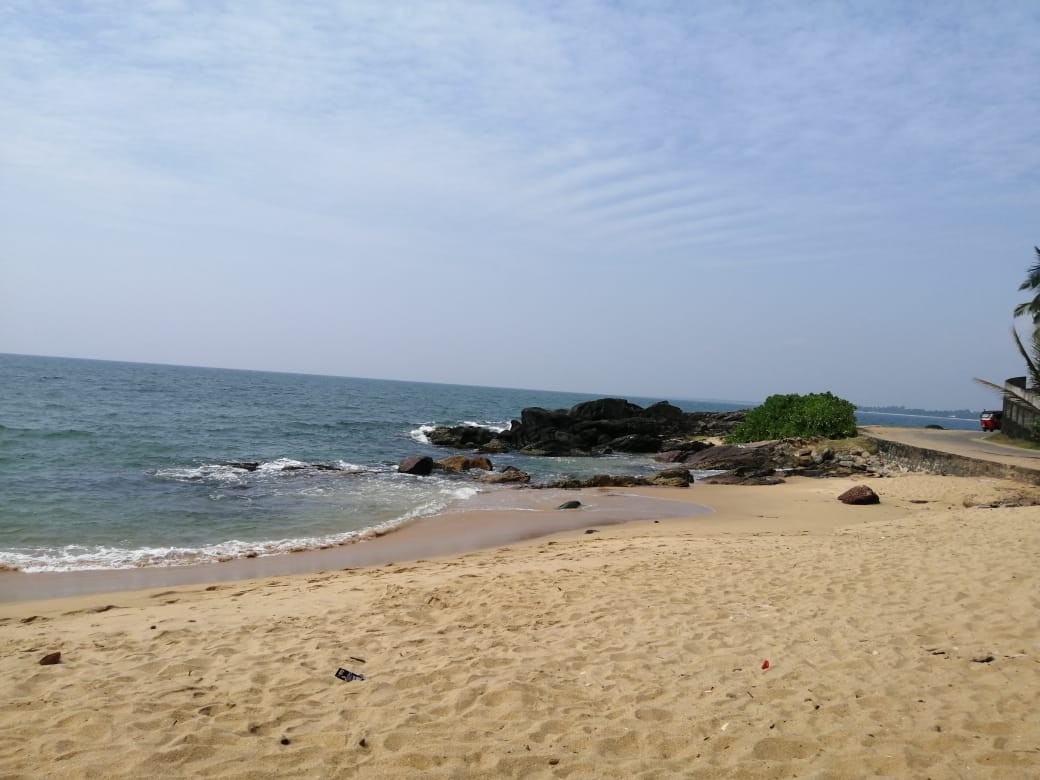
Life to Our Beaches Fuels the Clean Sri Lanka Campaign
Sri Lanka’s picturesque coastline is under threat from marine pollution and mismanaged waste, challenges that not only harm the environment but also undermine the country’s tourism and economic potential. In response, the Life to Our Beaches Project is making a tangible impact, creating cleaner, more resilient coastal areas while offering significant opportunities for the private sector to contribute to a sustainable future.
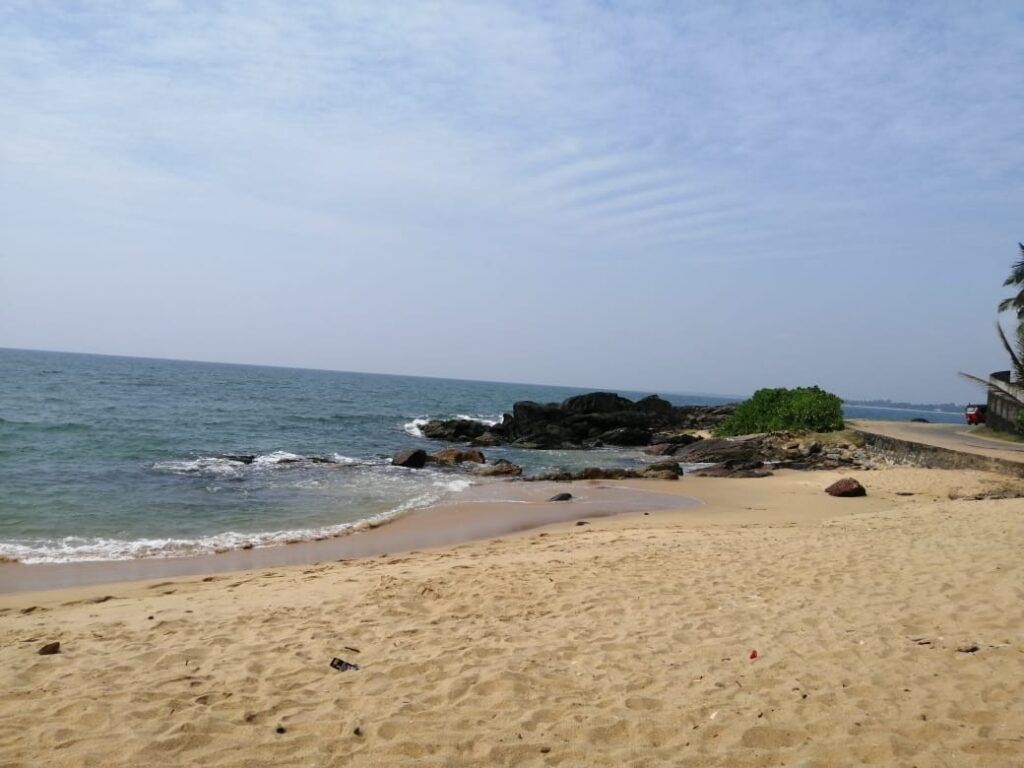
Cleaning Up for a Clean Sri Lanka
The Clean Sri Lanka campaign is now setting the national agenda for environmental stewardship, and the Life to Our Beaches Project is a shining example of such a vision in action. Two pilot projects, located at Kalutara’s Calido Beach and Beruwala’s Kechchimale Beach Park, have demonstrated how targeted interventions can restore the natural beauty of our coastal areas. At Calido Beach, a 500-meter stretch that was heavily polluted by waste from the Kalu River, concerted cleanup efforts led by a partnership between the Ministry of Environment, Biodiversity Sri Lanka (BSL), and Commercial Bank have resulted in the removal of over 1,586 kilograms of waste. Similarly, the Kechchimale Beach Park project in Beruwala, supported by the Bank of Ceylon, tackled pollution stemming from plastic waste and sewage from the local fishery harbor, removing 169 kilograms of debris.
Beyond environmental cleanup, these initiatives have also provided socio-economic benefits. Beach caretakers, who are predominantly from economically disadvantaged communities, have earned supplementary income through the recycling of waste. For example, the caretaker at Calido Beach generated earnings of LKR 35,585 through recyclable sales. Such outcomes not only contribute to a cleaner environment but also enhance livelihoods, underscoring the holistic benefits of sustainable beach management.
Opportunities for the Private Sector
For private sector players, the Life to Our Beaches Project represents more than just a charitable endeavor—it is a strategic opportunity to drive corporate social responsibility (CSR) initiatives, boost brand reputation, and contribute to the national Clean Sri Lanka campaign. Companies that invest in or sponsor these projects can benefit from enhanced visibility, positive community engagement, and alignment with global sustainability trends.
Leading financial institutions like Commercial Bank and the Bank of Ceylon have already set a precedent by supporting these initiatives. Their involvement demonstrates how aligning business strategies with environmental goals not only fulfills regulatory and CSR mandates but also opens up new avenues for innovation and growth. In today’s market, consumers and investors increasingly favor companies that are committed to environmental stewardship, and involvement in such projects can significantly enhance corporate image and competitiveness.

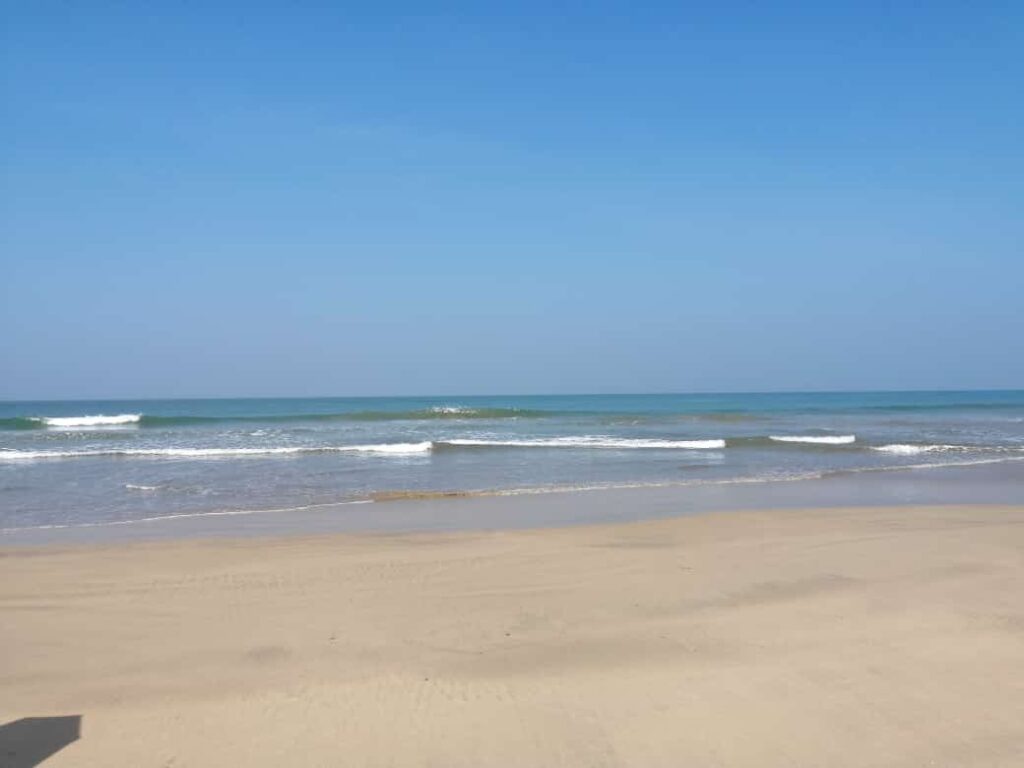
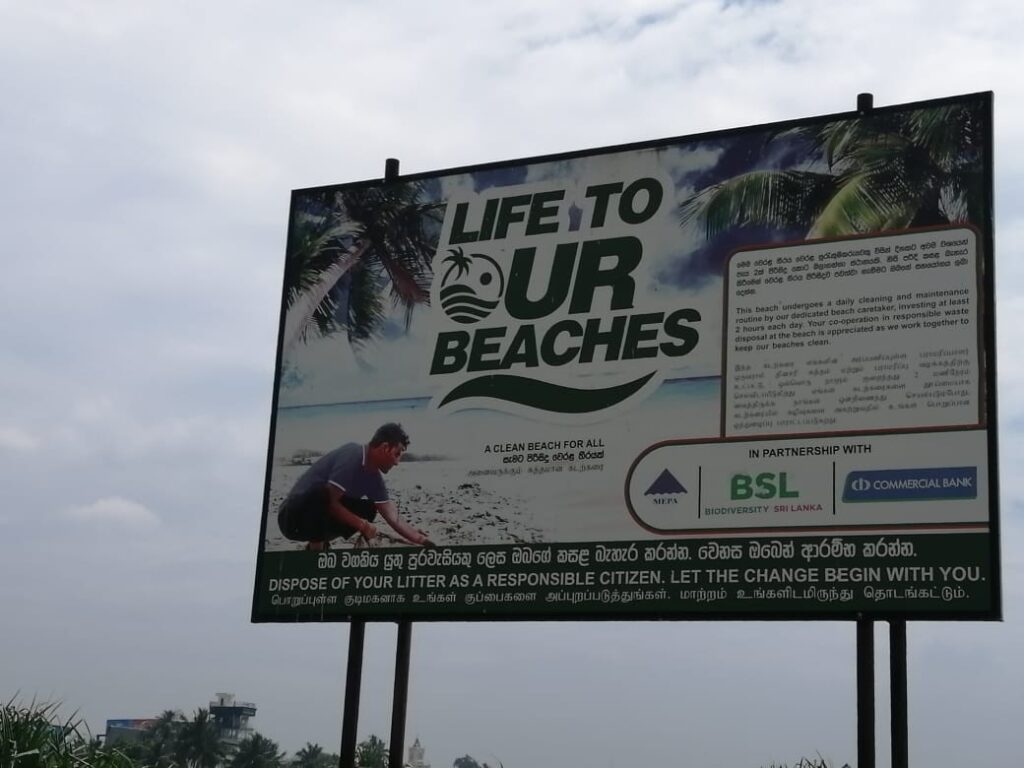
Scaling Up and Future Prospects
Building on the success of the pilot projects, the Life to Our Beaches Project is set to expand to new locations, including Kayankerni Beach in Batticaloa, Eastern Province. This expansion aims to replicate the successes seen at Calido Beach and Kechchimale Beach Park while addressing unique challenges specific to each coastal region. The new project in Batticaloa will focus on reducing plastic pollution, improving waste management systems, and empowering local communities through sustainable beach stewardship.
Moreover, future efforts will include continuous training for beach caretakers to enhance their operational efficiency, structured recruitment and retention strategies to maintain long-term commitment, and the launch of media campaigns to boost public awareness and attract further corporate support. By scaling up these initiatives, the programme aims to create a network of clean and sustainable beaches across Sri Lanka, contributing significantly to the Clean Sri Lanka campaign and setting a benchmark for environmental responsibility in the private sector.
A Call to Action for Sustainable Impact
The transformation of Sri Lanka’s coastlines through the Life to Our Beaches Project exemplifies how coordinated efforts between government, NGOs, and the private sector can lead to measurable environmental and socio-economic improvements. For the private sector, this initiative offers a unique platform to drive innovation in waste management, foster sustainable business practices, and demonstrate a commitment to the nation’s environmental goals.
As Sri Lanka strives towards a cleaner, more sustainable future, the active participation of private companies is crucial. By investing in these projects, businesses can not only help protect one of the country’s most valuable natural assets but also contribute to the broader national agenda of a Clean Sri Lanka. In doing so, they will not only reap economic and reputational benefits but also play a pivotal role in shaping a greener, more resilient future for all.
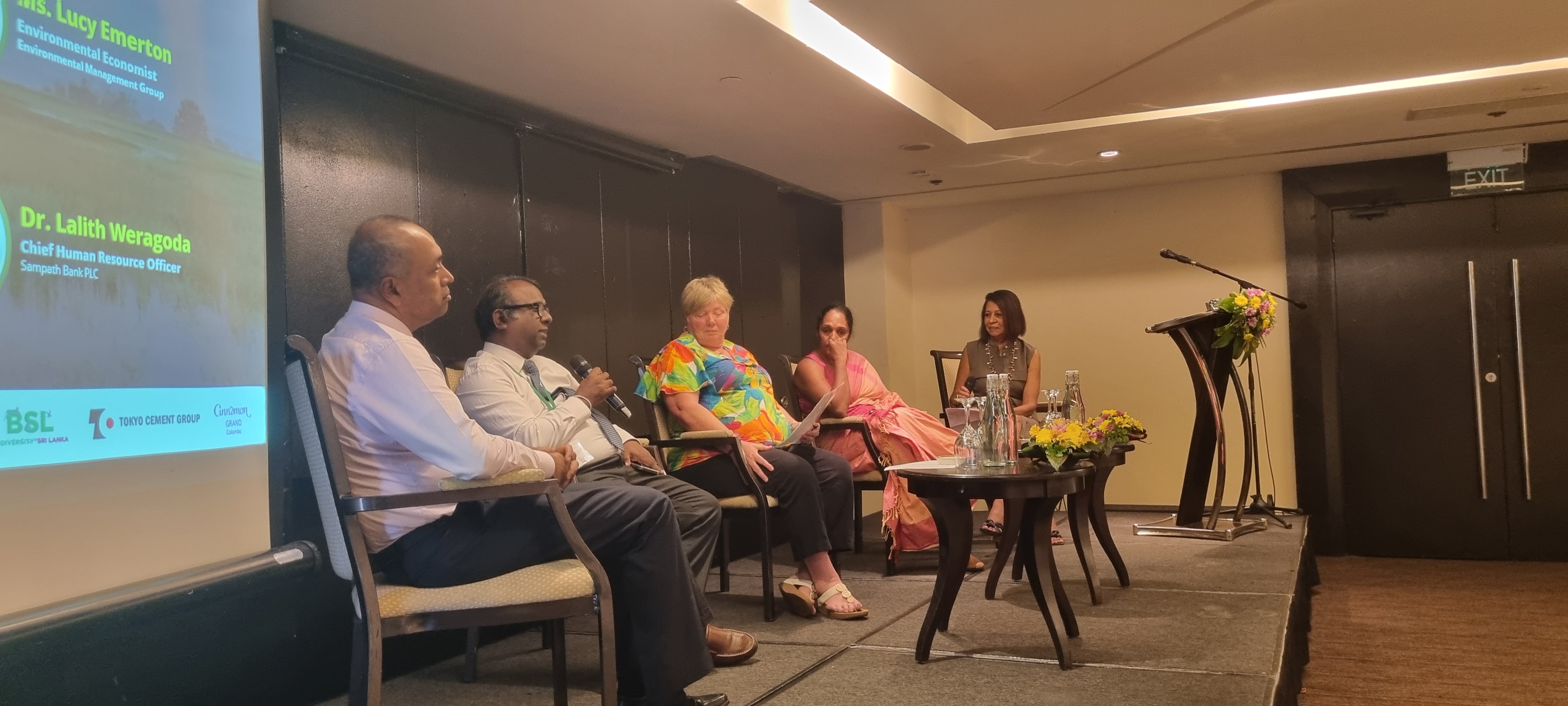
World Wetland Day Celebrations 2025: A Unified Effort to Protect Vital Ecosystems
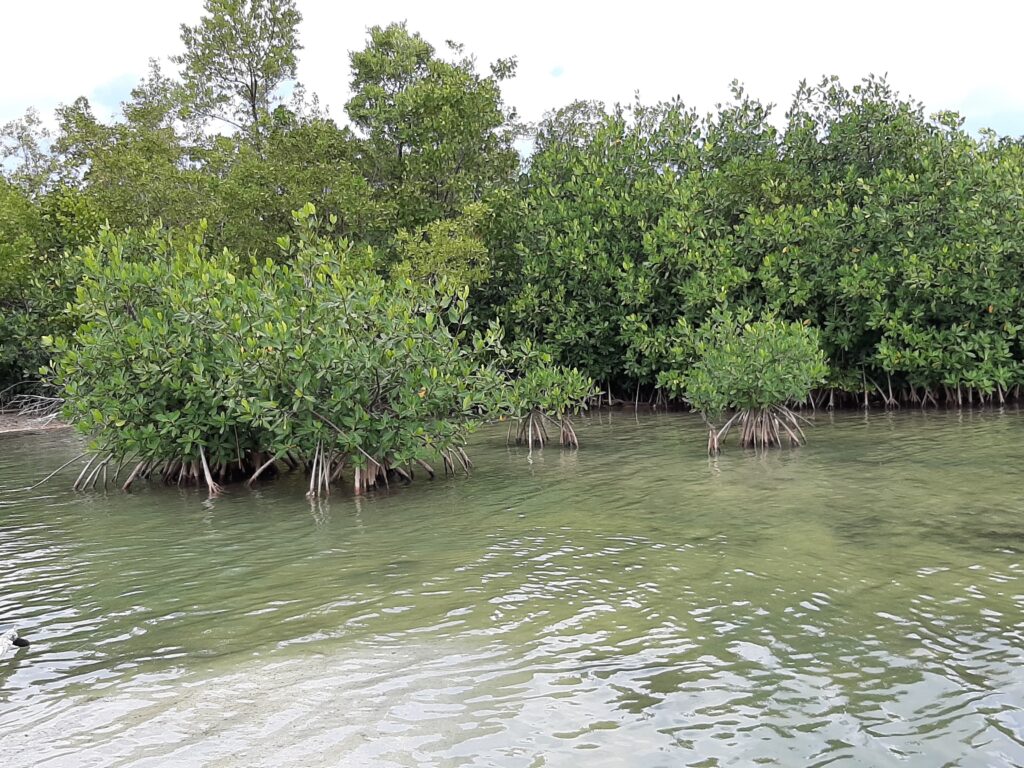
On 5th and 6th February 2025, Sri Lanka joined the global community in celebrating World Wetlands Day, under the theme “Protecting Wetlands for Our Common Future”. This theme is particularly pertinent to Sri Lanka, a nation endowed with diverse wetland ecosystems that are vital for ecological balance and community livelihoods. Wetlands in Sri Lanka serve as habitats for numerous endemic species, support agriculture and fisheries, and act as natural defenses against flooding and erosion. However, these ecosystems face threats from urbanization, pollution, and climate change. The theme calls for collective action to safeguard these invaluable resources, ensuring they continue to benefit both nature and society. In alignment with this global initiative, Biodiversity Sri Lanka (BSL), in partnership with Cinnamon Grand Colombo, Tokyo Cement Group, Dole Lanka, and Cargills Ceylon PLC, orchestrated a series of events aimed at raising awareness and fostering collaborative conservation efforts.
Engaging the private sector
At the Cinnamon Grand Colombo, BSL, in partnership with the Tokyo Cement Group, hosted a high-level panel discussion focusing on Green Finance for Wetland Conservation on 6th February 2025. The forum convened experts from finance, environmental science, and policy-making sectors to explore sustainable funding mechanisms for wetland preservation. Discussions highlighted the economic valuation of wetlands and the integration of green finance into national strategies, emphasizing the necessity of public-private partnerships in mobilizing resources for conservation.
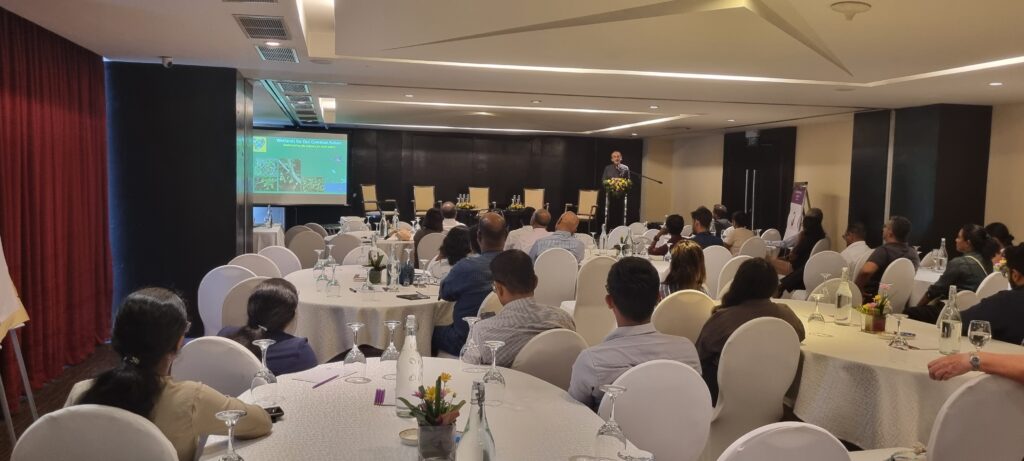
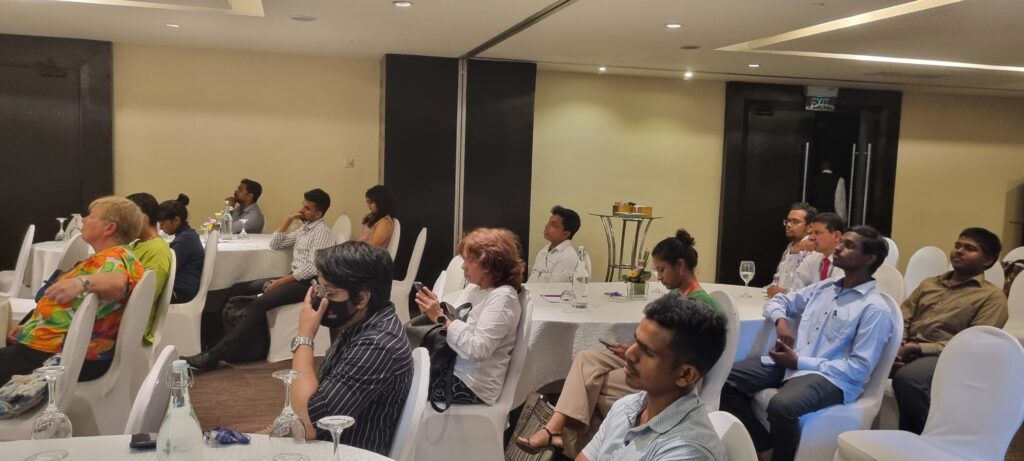
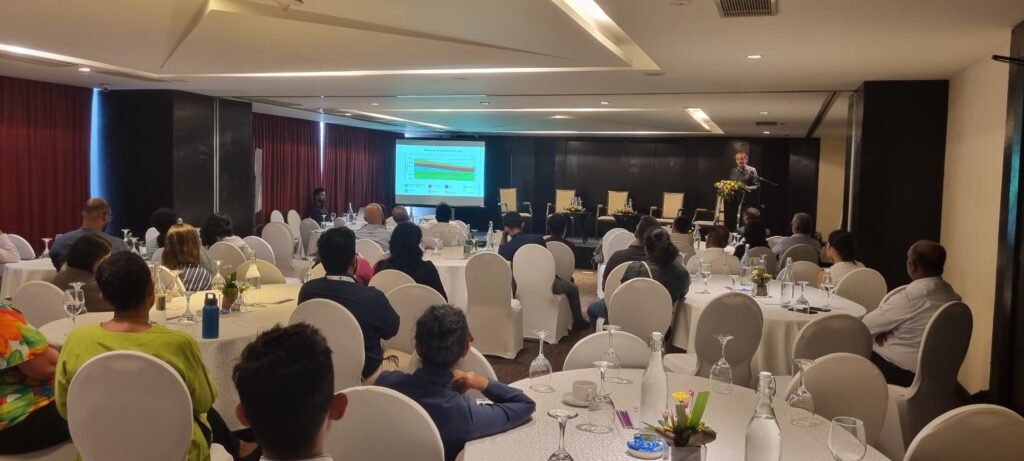
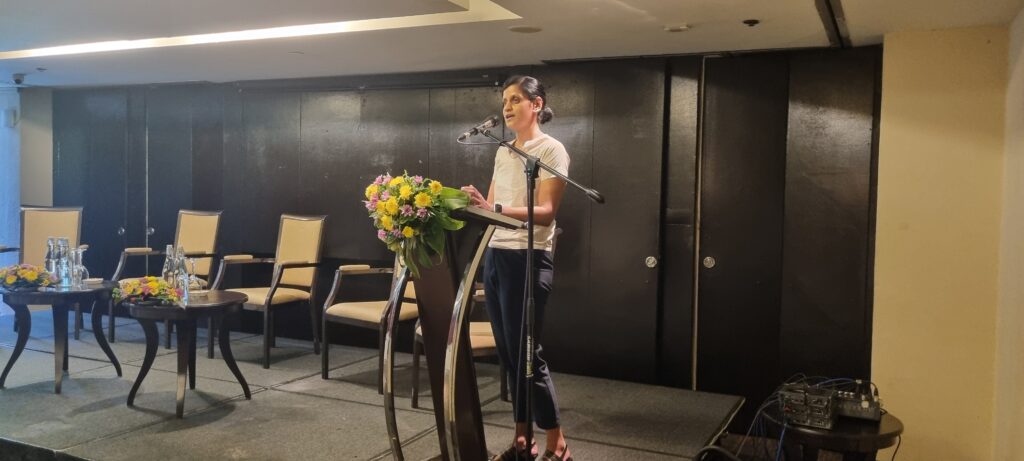
Key speakers at the event:
Ms. Chaturangi Wickramaratne (Researcher – Freshwater Ecologist, IWMI) highlighted how wetlands contribute to both ecological and economic stability, emphasizing the need for green finance integration into national economic strategies.
An interesting panel discussion was held moderated by BSL’s Senior Technical Advisor Ms Shiranee Yasaratne. The panelists included:
- Environmental Economist Lucy Emerton, who discussed the economic valuation of wetlands as a means of strengthening conservation policies.
- Nishantha Edirisinghe (Conservator General of Forests), who elaborated on Sri Lanka’s policy framework for wetland and mangrove conservation, focusing on the role of carbon offsetting initiatives.
- Professor Sewwandi Jayakody (Wayamba University), who explained how wetlands contribute to biodiversity conservation and climate resilience.
- Dr. Lalith Weragoda (Sampath Bank), who emphasized the growing role of the private sector in financing sustainable wetland conservation projects.
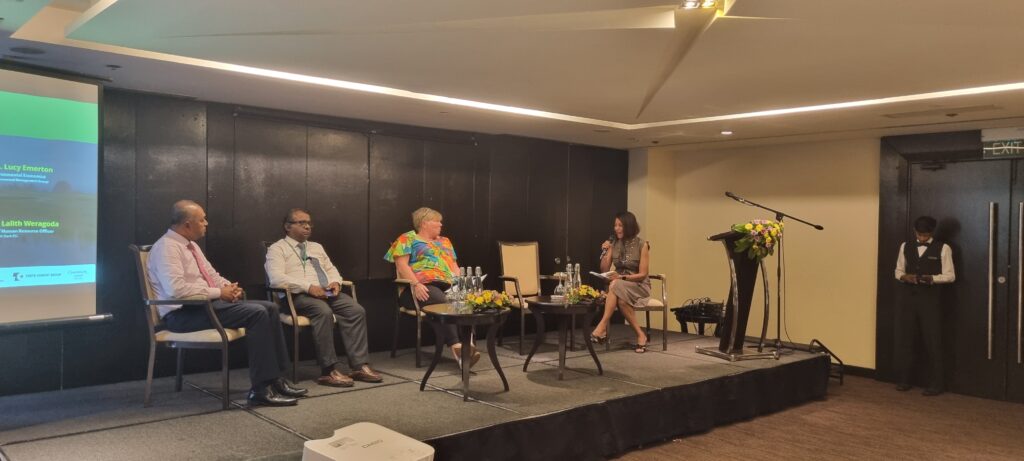
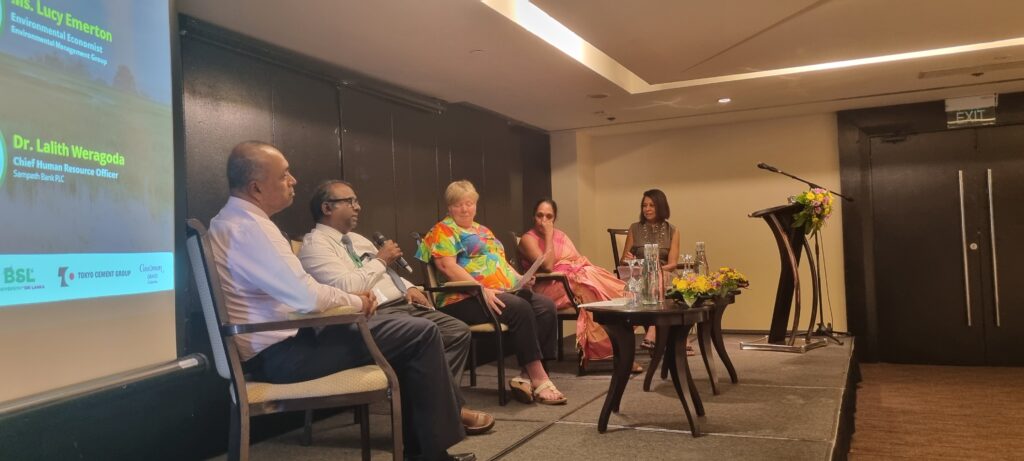
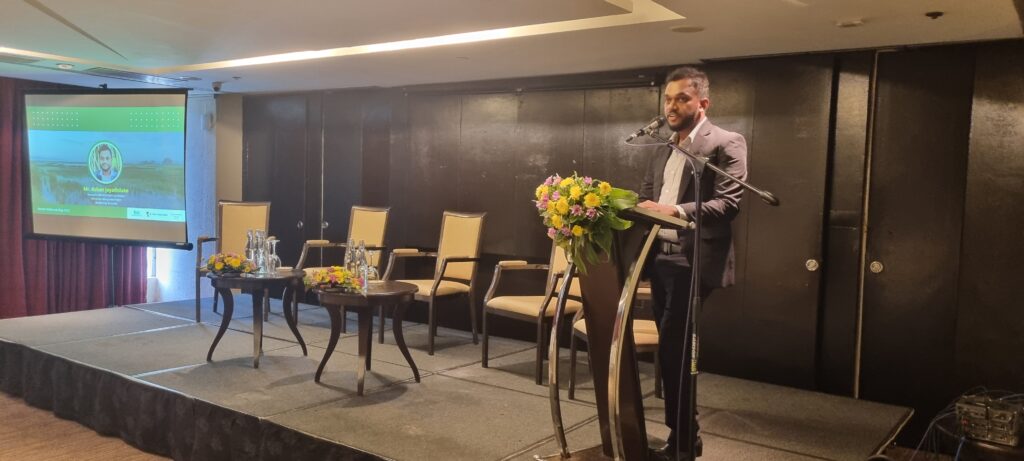
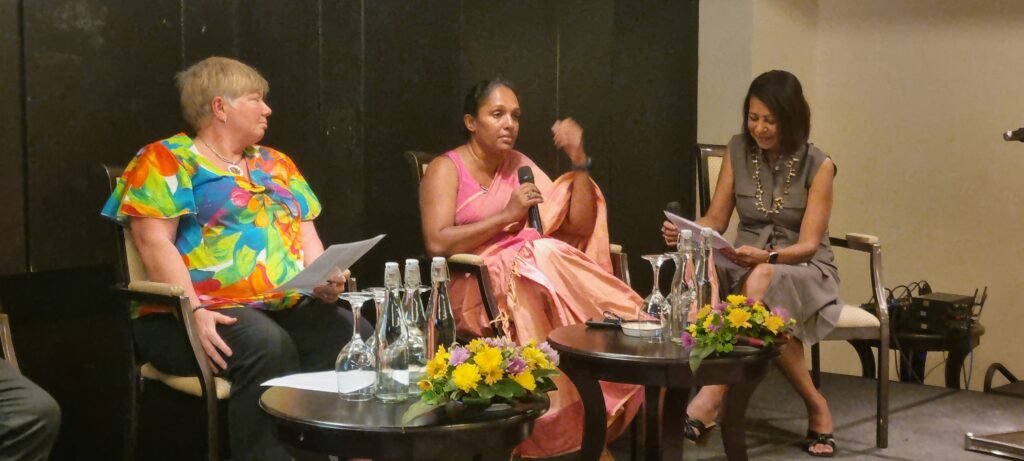
A Call for Stronger Public-Private Collaboration
The discussions stressed the importance of aligning Sri Lanka’s conservation goals with nature-based solutions, carbon offset strategies, and sustainable finance models. A key takeaway was the need for enhanced collaboration between policymakers, financial institutions, and conservation experts to ensure the long-term protection of wetlands. The event concluded with a call to action for increased investment in wetland restoration, stronger policy support, and innovative financial mechanisms to bridge conservation efforts with economic sustainability.
Looking Ahead: A Commitment to Conservation
The events organized by BSL exemplify a holistic approach to wetland conservation, combining education, financial investment, and policy dialogue. By aligning local initiatives with the global theme, Sri Lanka demonstrates its commitment to preserving wetlands as a shared responsibility. As the world prepares for the 15th Meeting of the Conference of the Contracting Parties to the Convention on Wetlands (COP15) in July 2025, these efforts underscore the importance of unified action in protecting wetlands for our common future.
Through these initiatives, BSL reaffirmed its commitment to wetland conservation and underscored the indispensable role of the private sector, financial institutions, and youth engagement in driving meaningful environmental change. As Sri Lanka continues to face ecological challenges, such proactive efforts will be essential in securing the future of its wetland ecosystems.

Ayurveda and Conservation Unite: Barberyn Ayurveda Resorts Becomes a BSL Member

We are thrilled to announce that Barberyn Ayurveda Resorts has joined Biodiversity Sri Lanka (BSL) as a new General Member. Nestled in the tranquil coastal town of Beruwala, Western Province, Sri Lanka, Barberyn Reef Ayurveda Resort Hospital is a sanctuary of holistic well-being and sustainable living. With a rich history spanning over 55 years, this pioneering Ayurvedic resort has seamlessly blended traditional healing practices with modern hospitality, creating a haven for those seeking rejuvenation and inner peace. Their membership in BSL is a testament to their unwavering commitment to environmental stewardship and sustainable development.
A Legacy of Holistic Healing and Sustainability
Founded in 1968 by visionaries Mr. Sudana Rodrigo and Mrs. Chitra Rodrigo, Barberyn Reef Ayurveda Resort Hospital has been at the forefront of Ayurvedic tourism in Sri Lanka. Their profound vision of sustainability, encompassing the sanctity of life, human consciousness, and inner peace, has guided the resort’s operations and growth. Today, under the leadership of their son, Manick Rodrigo, the resort continues to uphold these values, emphasizing human development that rests on the sustainability of life, both physical and spiritual.
Authentic Ayurvedic Healing
At the heart of Barberyn Reef Ayurveda Resort Hospital is its dedication to authentic Ayurvedic healing. The resort offers personalized treatment programs designed by experienced Ayurvedic doctors, including detoxification, rejuvenation, and stress relief therapies. Daily meditation and yoga sessions further enhance mental and physical well-being, while Ayurvedic cuisine, prepared according to Ayurvedic principles, focuses on nutrition and balance. Comprehensive wellness programs cater to various health needs, including weight management, skin care, and chronic illness management.
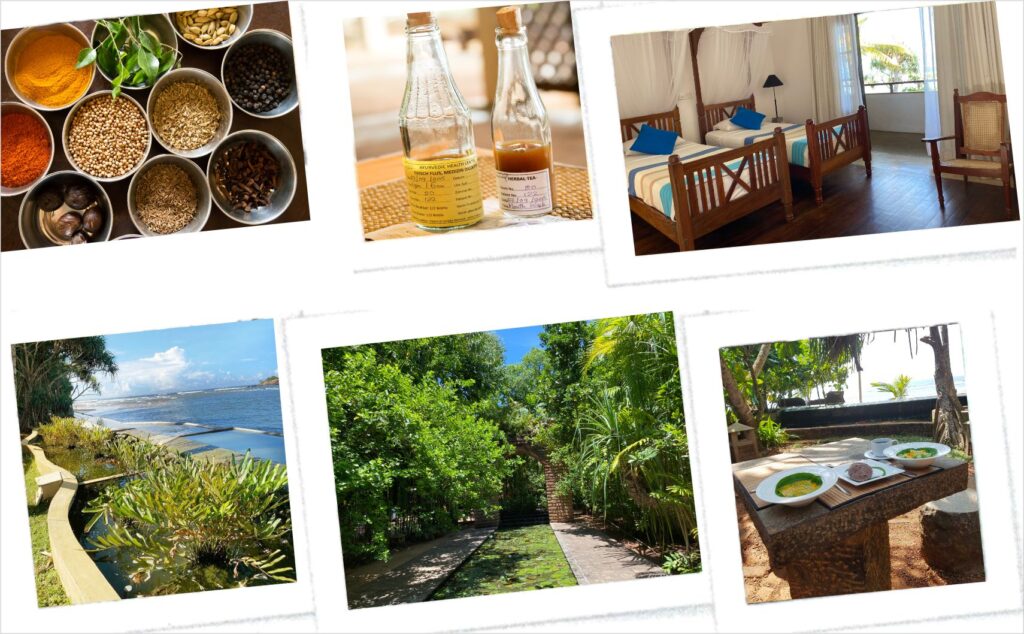
A Commitment to Sustainability
Barberyn Ayurveda Resort’s commitment to sustainability is evident in every aspect of its operations. The resort’s sustainability initiatives align seamlessly with the goals of Biodiversity Sri Lanka, making BSL membership a natural and harmonious partnership.
Reduce, Reuse, Recycle
The resort has implemented a robust waste management system, categorizing waste as degradable and non-degradable. Non-degradable waste is further sorted into plastic, iron, and glass, with plastic cans repurposed to grow plants in the nursery. Organic waste is recycled into compost and biogas, while non-degradable waste is sold for recycling. These efforts not only reduce waste but also promote a circular economy, aligning with BSL’s mission to promote sustainable resource management.
Go Green to Breathe Clean
With 80% of the land covered in greenery, predominantly herbal plants, Barberyn Reef Ayurveda Resort Hospital is a verdant oasis. The resort maintains a herbal plant nursery to supply medicinal plants for Ayurvedic treatments and propagation. This green coverage not only enhances the resort’s aesthetic appeal but also contributes to biodiversity conservation, a core focus of BSL.
Live Under Eco-Friendly Shelters
The resort’s buildings are designed with sustainability in mind, featuring natural ventilation to reduce the need for air conditioning and minimizing the use of plastics in construction. Most furniture is made from wood, further reducing the resort’s environmental footprint. These eco-friendly practices align with BSL’s goal of promoting sustainable building and construction practices.

Sustainability Through Renewable Energy
Barberyn Reef Ayurveda Resort Hospital has embraced renewable energy by installing solar panels for electricity generation. With a goal to meet the entire energy requirement through solar power by 2025, the resort is making significant strides towards reducing its carbon footprint. This commitment to renewable energy aligns with BSL’s mission to promote clean and sustainable energy solutions.
Path to Vegetarian – Take Extinction Off Your Plate
The resort has made efforts to minimize meat consumption due to its environmental impact, promoting a predominantly vegetarian diet. Innovative cooking methods are used to reduce edible food waste, further contributing to sustainability. These initiatives resonate with BSL’s focus on sustainable food systems and reducing the environmental impact of food production.
Sustainable Procurement
Barberyn Reef Ayurveda Resort Hospital sources eco-friendly products and materials, supporting local suppliers and producers to reduce the carbon footprint of hotel operations. This commitment to sustainable procurement aligns with BSL’s goal of promoting environmentally responsible business practices.
Clean Ocean for Healthy Joy
The resort conducts daily beach clean-up sessions to keep the shore free from plastics, contributing to marine conservation. This initiative aligns with BSL’s focus on protecting marine ecosystems and promoting clean oceans.
Environmental Education
Barberyn Reef Ayurveda Resort Hospital provides training and awareness programs for staff, guests, and the local community. Webinars, workshops, and seminars on sustainable tourism and the usage of indigenous medicine further promote environmental education. These efforts align with BSL’s mission to raise awareness and educate stakeholders on biodiversity conservation.
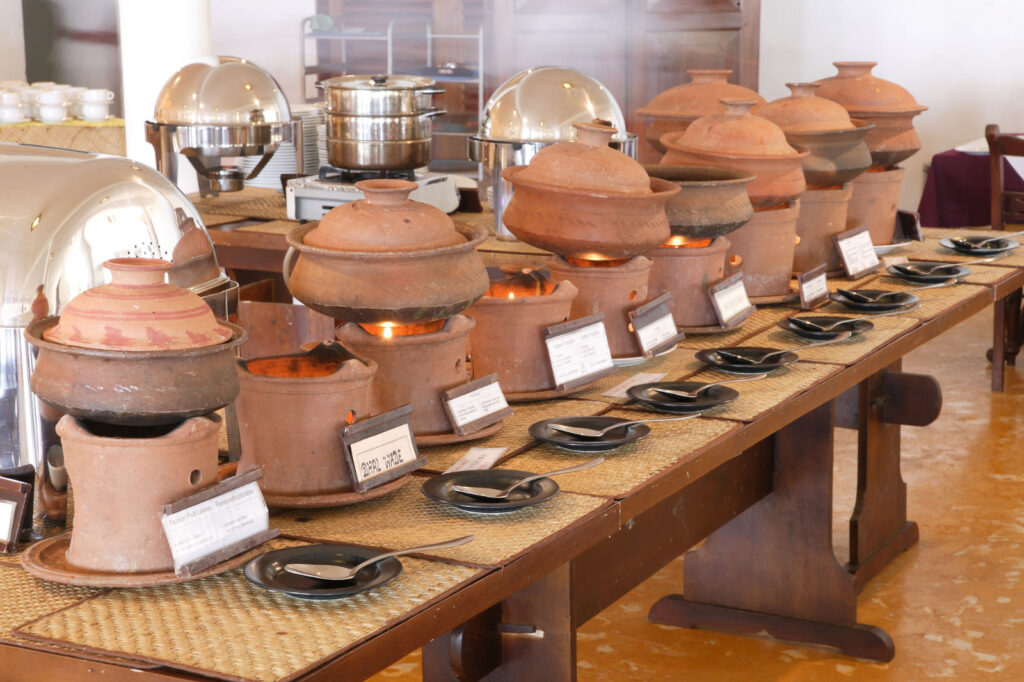
Environmental Conservation Projects
The resort is actively involved in mangrove conservation in the Didduwa area, tree planting initiatives, and maintaining medicinal plantations over 50 acres. These projects promote reforestation, combat climate change, and enhance biodiversity, aligning with BSL’s focus on habitat restoration and conservation.
Science for Every Single Bit of Nature
Barberyn Reef Ayurveda Resort Hospital has constructed wastewater treatment and biogas production plants using scientific approaches. Water used for consumption is tested every three months to ensure safety. These initiatives align with BSL’s mission to promote scientific research and innovation in environmental conservation.
Awards and Recognition
- Presidential Environmental Award 2024 – (Silver Award in Hotel Sector)
- Presidential Environmental Award 2023 – (Merit Award in Hotel sector)
- Presidential Environmental Award 2022 – (Merit Award in Hotel sector)
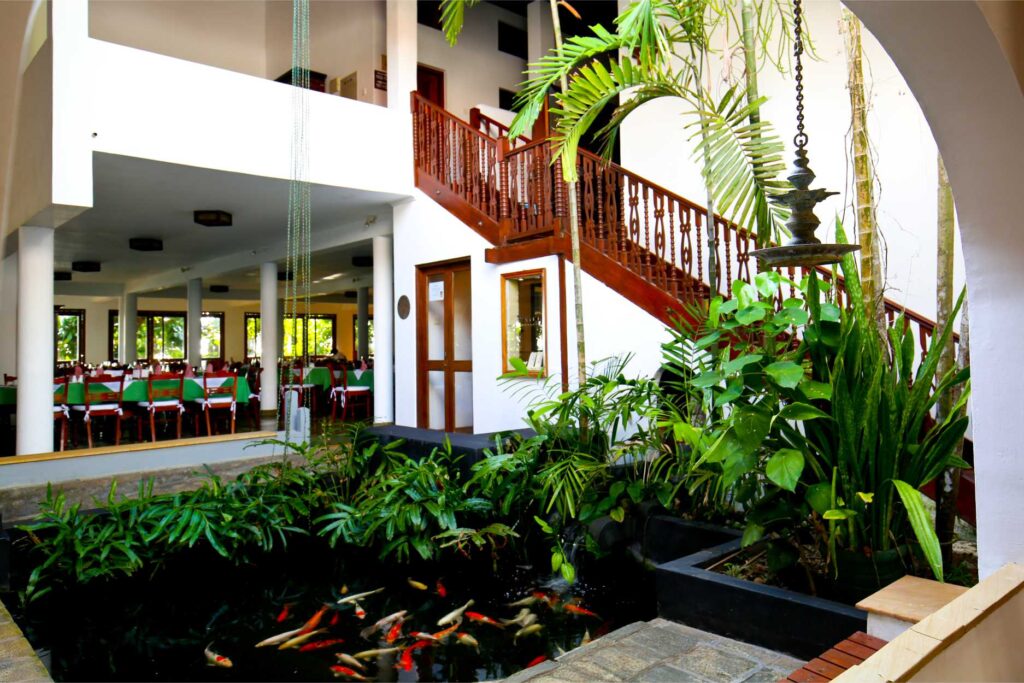
A Vision for the Future
As Barberyn Ayurveda Resorts joins Biodiversity Sri Lanka, it is a testament to their shared vision of a sustainable future. The resort’s holistic approach to well-being, combined with their commitment to environmental stewardship, makes them a valuable partner in BSL’s mission to conserve biodiversity and promote sustainable development.
Barberyn Ayurveda Resort’s membership in Biodiversity Sri Lanka is a natural alignment of values and goals. Their dedication to authentic Ayurvedic healing, sustainable practices, and environmental conservation makes them a beacon of sustainable wellness. As they continue to lead by example, Barberyn Ayurveda Resorts and Biodiversity Sri Lanka will work together to create a healthier, more sustainable future for all.
For further information, please visit the Barberyn Ayurveda Resort’s website: https://www.barberynresorts.com
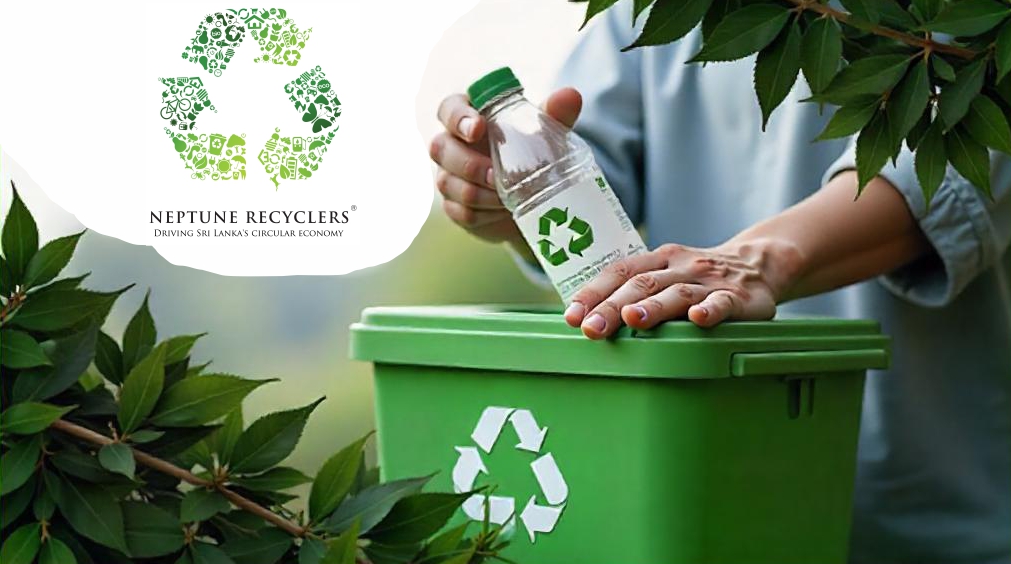
Driving the Circular Economy Towards a Sustainable Future!
Biodiversity Sri Lanka (BSL) is delighted to welcome Neptune Recyclers as a General Member. This partnership fosters innovation and impactful action to conserve Sri Lanka’s biodiversity and promote sustainable business practices.
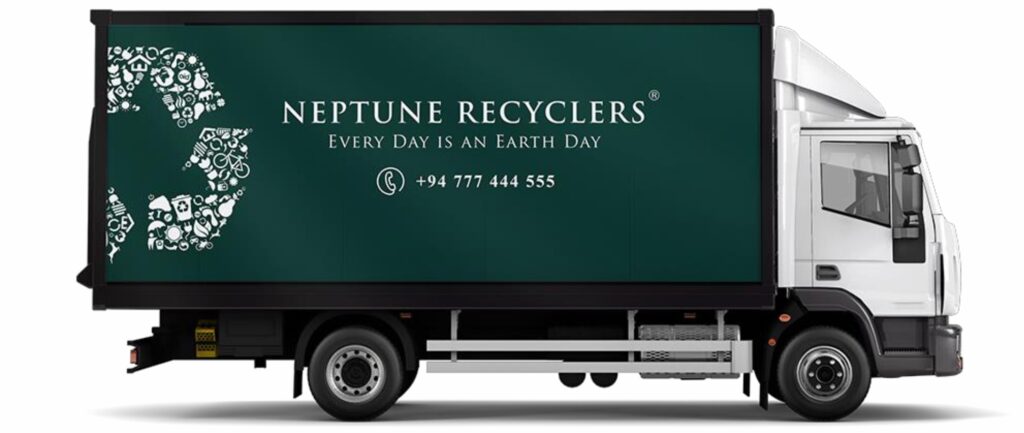
Pioneers in Recycling
Neptune Recyclers has been at the forefront of Sri Lanka’s waste management sector for over 30 years. As a subsidiary of Ex-Pack Corrugated Cartons PLC and part of Aberdeen Holdings (Pvt) Ltd., they have built an impressive legacy of innovation, efficiency, and sustainability.
With over 600,000 metric tons of recyclable materials processed to date, including 400,000 tons of cardboard and 200,000 tons of paper, Neptune Recyclers has made a remarkable economic and environmental contribution, generating $160 million in value for Sri Lanka.
Circular Economy Champions
At the heart of Neptune Recyclers’ operations is the circular economy – a system where waste is minimised, and resources are continuously reused. Through cutting-edge recycling processes, they transform PET waste into high-quality materials and ensure that every step of the recycling cycle supports a sustainable future.
Their focus on achieving Sustainable Development Goal 12 (Responsible Consumption and Production) perfectly aligns with BSL’s mission. By reducing waste and conserving resources, Neptune Recyclers contributes to preserving biodiversity and promoting a greener economy.
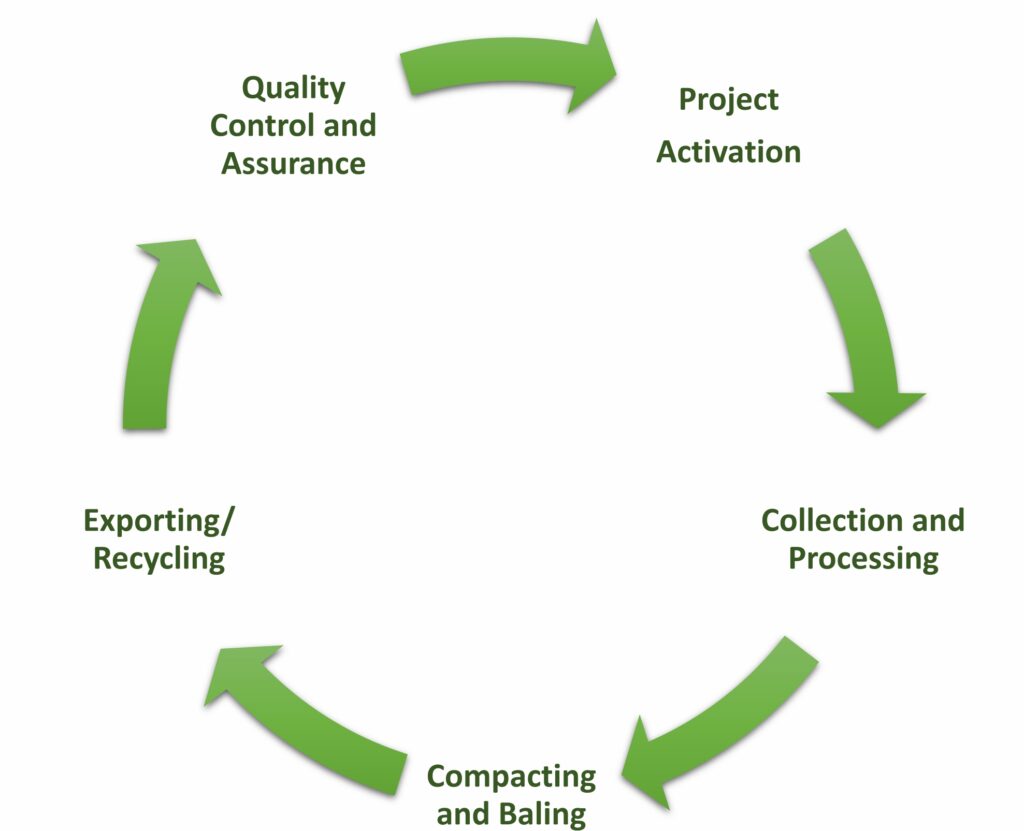
Tech-Driven Sustainability
Neptune Recyclers is renowned for its investment in advanced technologies. From industrial shredders capable of processing one metric ton of paper per hour to automated baling systems optimised for operational efficiency, their infrastructure is designed to deliver high-impact results while minimising environmental footprints.
The integration of state-of-the-art weighbridges and precision baling equipment further underscores their commitment to sustainable practices. These innovations not only optimise waste management processes but also demonstrate how technology can drive environmentally responsible business practices.
Global Recognition
Neptune Recyclers’ unwavering commitment to excellence has earned them numerous accolades, both locally and internationally. Some of their most notable achievements include:
- Bronze Award at the 2024 Presidential Environment Awards for their outstanding work in solid waste recovery and recycling.
- Gold MSME ESG Excellence Award from the MBA Alumni Association of the University of Colombo, recognising their leadership in environmental, social, and governance initiatives.
- Silver Award from the National Chamber of Exporters of Sri Lanka, highlighting their contributions to sustainable exports.
- Being the only waste management entity in Sri Lanka certified Zero Waste to Landfill by Intertek.
- Securing 4th position among the Top 50 Best Workplaces in Sri Lanka by Great Place to Work and being placed on the prestigious Great Place to Work Asia List.
These accolades reflect Neptune Recyclers’ dedication to setting high standards in environmental sustainability, waste management, and corporate responsibility.
Impact Beyond Operations
Neptune Recyclers’ influence extends far beyond their recycling facilities. They are deeply committed to empowering communities and businesses through educational outreach and awareness campaigns.
Their initiatives focus on equipping stakeholders with the knowledge and tools to adopt responsible waste management practices. By fostering a culture of sustainability, Neptune Recyclers inspires individuals and organisations to become active participants in the fight against environmental degradation.
A Perfect Match with BSL
Neptune Recyclers’ ethos of “giving back to the planet and people” aligns seamlessly with BSL’s mission to integrate biodiversity conservation into corporate strategies. Both organisations are driven by a shared vision of sustainability and recognise the importance of private sector leadership in protecting natural ecosystems.
As a General Member of BSL, Neptune Recyclers brings a wealth of expertise in sustainable waste management. This partnership opens the door to collaborative projects, innovative solutions, and impactful initiatives that address Sri Lanka’s most pressing environmental challenges.
Collaborating for Change
By joining BSL, Neptune Recyclers becomes part of a vibrant network of businesses committed to creating a positive environmental legacy. Through this partnership, Neptune Recyclers gains the opportunity to:
- Contribute Expertise: Share insights and best practices in waste management and recycling.
- Participate in Programmes: Engage in BSL-led initiatives such as biodiversity restoration and sustainable corporate practices.
- Amplify Awareness: Leverage BSL’s platform to expand their educational campaigns and reach a broader audience.
- Support LIFE Series Projects: Actively participate in BSL’s LIFE Series projects to enhance sustainability outcomes and create impactful, scalable solutions for biodiversity conservation.
A Bright Future for Sustainability
This partnership is a testament to the power of collaboration. By uniting the strengths of BSL and Neptune Recyclers, we are creating a foundation for transformative change. Together, we aim to drive impactful solutions that benefit Sri Lanka’s environment, economy, and communities.
Neptune Recyclers’ expertise in waste management and their commitment to sustainable development make them an invaluable addition to the BSL family. Their membership signifies a step forward in achieving our shared vision of a greener, more sustainable Sri Lanka.
BSL’s Warm Welcome
On behalf of Biodiversity Sri Lanka, we extend a heartfelt welcome to Neptune Recyclers. We are excited to work alongside an organisation that shares our passion for sustainability and biodiversity conservation.
As we embark on this journey together, let’s work hand-in-hand to protect Sri Lanka’s natural heritage and build a brighter, more sustainable future for generations to come. For more information about Neptune Recyclers and their initiatives, visit their website at: https://neptunerecyclers.com
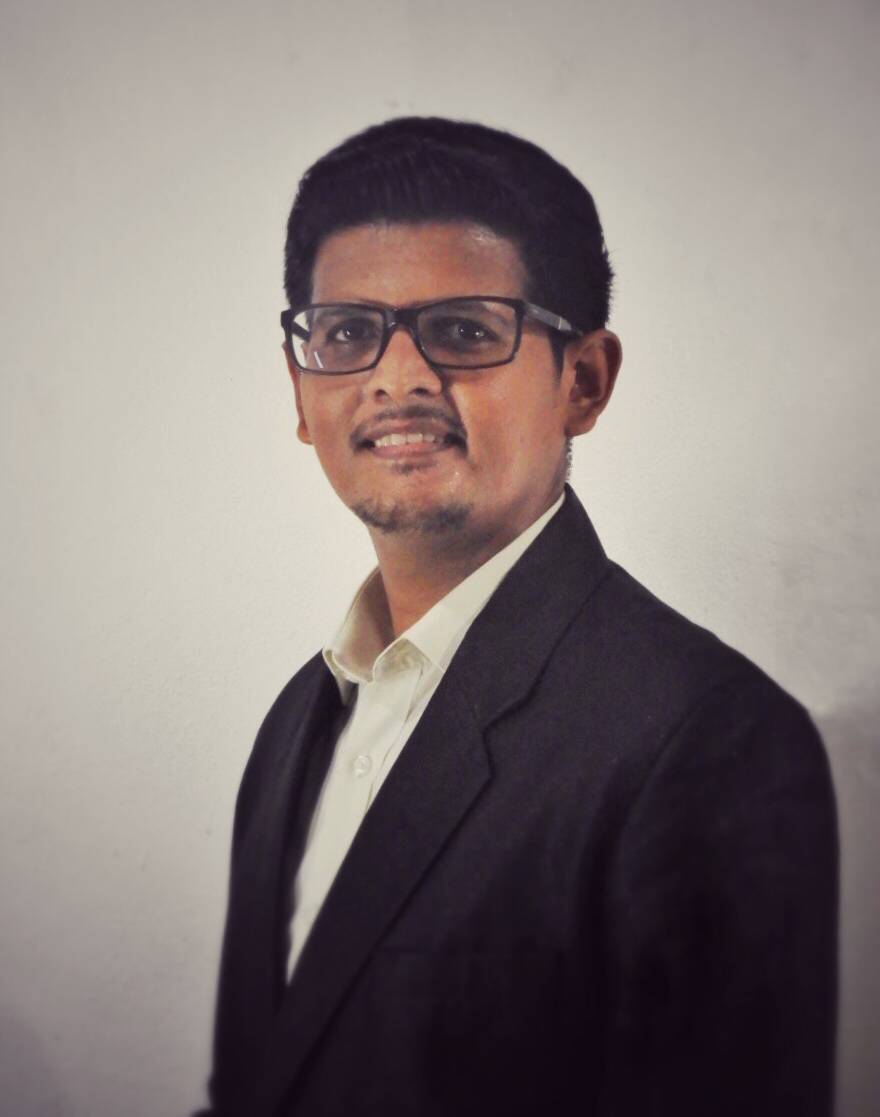
In Conversation
This month we met with Rookantha Rajapakse, Manager Forestry & Certifications of Lalan Agri Diviision, Lalan Group in our “IN CONVERSATION” segment. Rookantha serves as the BSL Focal Point for General Member Lalan Rubbers.
BSL: Briefly introduce your company and yourself
A: Lalan Agri Division (LAD) which is one of Sri Lanka’s highest-yielding rubber plantations, is a part of Lalan Group, a pioneer in rubber manufacturing in South Asia. LAD’s commitment to the highest standards of quality forms the backbone of its operations. LAD’s 15 estates located in the Kegalle and Kurunegala Districts in Sri Lanka spans over some 9000 hectares of land, where a multitude of crops have been cultivated including rubber, coconut, cinnamon, oil palm, tea, and forestry. The estates engage over 3000 employees – skilled and unskilled workers, staff and management personnel. Crop diversification has helped LAD in enhancing land productivity of the estates which has directly resulted in the increase of worker earnings. The diversified crop portfolio provides LAD with a natural hedge against adverse impacts from environmental factors, plant diseases and price fluctuations in commodity markets, making LAD’s operations more sustainable. The varying range of crops helps in improving bio diversity of these large areas of estate lands and in maintaining the ecological balance of the environment.
I have been with the Company for over ten years, and at present hold the position of Manager, Forestry and Certifications. I earned my Bachelor’s degree in Science from the University of Sri Jayewardenepura, and my Master’s degree in Business Administration from Cardiff Metropolitan University.
BSL: What drives your sustainability agenda, and what are the key focus areas?
A: We are FSC™ certified (FSC-C101709) and have complied with the FSC standards since 2010. Due to sustainability compliance, we are in a favorable position to measure and comprehend, our economic, environmental and social impacts to our stakeholders. The company provides a host of facilities to all employees and their families on the estates, regardless of employment status, including housing, medical care, preschool facilities and pre- and post-natal care. The LAD managed estates have a residential population of approximately 15,000, and are the direct beneficiaries of the estate operations. It is believed that a similar number or more persons (such as contractors, suppliers who transact with the estates and their families) could be identified as indirect beneficiaries of these estate economies. We are especially proud of the high standards of agricultural practices that we adopt and the way we train and develop our employees, and how much we care about protecting the environment.
BSL: Give us an outline of your current sustainability initiatives/ Projects
A: Since its inception LAD has been engaged in carrying out social welfare projects that benefit not only the communities within our estates, but also the population of the villages and towns in the vicinity of its estates. Since 2013 these activities have been expanded with additional funding sourced from the Fair Rubber Organization. So far, we have completed over 100 projects worth Rs 46 million benefitting significant number of beneficiaries. We carry out these projects focusing on the 17 Sustainable Development Goals, to achieve a better and more sustainable future for all. Social welfare projects completed so far include provision of access to clean water, improving the living conditions in worker housing, providing facilities and assistance for children’s education & growth, provision of medical facilities, assisting in the maintenance of religious and culturally significant locations, provision of sports/recreational facilities & encouraging the communities to participate in sports. The restoration of Sri Lanka’s only motorable suspension bridge located in Deraniyagala, Sri Lanka, which spans over the Seethawaka River, and its periodic maintenance is a significant highlight.
Suspension bridge – Reucastle Estate, Deraniyagala
Land is one of the most valuable resources of a plantation. LAD invests heavily in the soil conservation and moisture retention activities, through draining, terracing, erosion control, etc.
BSL: What are your company’s key achievements in the sustainability domain and the reasons behind your success?
A: The company has managed to reduce its CO2 emissions by an average of 4,677 tons per year, through the restoration of 225 hectares of degraded land by planting of Rubber. The company has been able to neutralize some emissions from downstream glove manufacturing activities using the carbon credits earned through the emissions reduced from the aforementioned project. Our most recent Biodiversity assessment, conducted across all 15 estates with the help of Prof. Devaka Weerakoon and his team of experts from the Colombo University, resulted in the sighting of the dragonfly “Flint’s Cruiser (Macromia flinti)” in a riverine habitat on one of our estates. This detection is particularly significant because this would be the first confirmed record of this critically endangered species in 50 years, which had been previously listed as a Data Deficient species due to a lack of records.
Flint’s cruiser – Macromia flinti (Photo credit: Mr. Amila Sumanapala)
The company’s efforts in protecting the environment have been significant. With the company’s help, over 60 High Conservation Value (HCV) sites and approximately 850 hectares of forest lands have been conserved. In addition, all possible steps have been taken to preserve the stream reservations as well as the mountain tops located in the agricultural fields. The above achievements would not have been possible without the conscious decisions of our management directed at the creation of long-term value & sustainability, and their general strategic supervision. This enthusiasm permeates throughout the organization, resulting in everyone working together to achieve the company’s sustainability objectives.
BSL: What are the challenges you see in driving your sustainability agenda forward in the current, extremely volatile business context?
A: It is problematic that the country’s PESTEL factors are unclear and uncertain. In the post-Covid era, the industry has been severely affected by several diseases, shortages of workers, short-sighted and adhoc decisions of the policy makers and the global economic downturn. However, the company’s commitment to sustainability remains unchanged as we continue to pursue success in all areas.
BSL: Any interesting future plans?
A: Despite all the country’s issues, the company is committed to expanding its operations. The triple bottom line is where we will be putting our efforts into bettering our current practices. In order to better equip its workforce, the company will continue to focus on empowering the workers, while helping them with welfare projects in conjunction with the Fair Rubber Organization.
BSL: Any message/s/ recommendation/s to BSL Members aspire to be leaders in Corporate Sustainability?
A: The secret to success is the desire to excel at what you do, and to do it with purpose. Do not engage in sustainability work for the sole purpose of enhancing your company’s image. This is not a simple task, as you must collaborate with individuals at varying levels and categories while facing multiple obstacles. However, you will be proud of the outcomes, and the environment will improve over time.

IN CONVERSATION
In our “In Conservation” segment this month, we were happy to chat with Kshanika Goonesekera, Ph.D., Manager, Environmental Sustainability, MAS Intimates. Our Member Focal Points are the backbone of BSL.
BSL: Give us a brief introduction about your company and yourself
A: MAS Intimates is the largest subsidiary of South Asia’s largest apparel manufacturer, MAS Holdings. MAS Intimates is responsible for designing, developing, and manufacturing for some of the world’s leading lingerie brands. Over the last three and a half decades, MAS Intimates has differentiated itself in the global fashion industry through its innovation mindset, strong technical competency, and making sustainability a foundation of the product creation process. It has design and development offices in Hong Kong and Sri Lanka with a presence in New York and London. MAS Intimates is also home to 17 state-of-the-art manufacturing facilities in Sri Lanka, Bangladesh, India, Indonesia, and Kenya with a rapidly growing global footprint.
I am a molecular biologist by training with a background in ecology, microbiology, and phylogenetics, working as the Manager, Environmental Sustainability at MAS Intimates. This may not be the conventional combination of qualifications that are needed for working in environmental sustainability for an apparel manufacturer. However, I have been pleasantly surprised at how useful these skills have been when overseeing the different areas that come under my purview at MAS Intimates.
Board at Udawalawe describing the invasive removal project
BSL: What drives your Company’s sustainability agenda and what are its key focus areas?
A: MAS Intimates’ efforts to drive a positive impact on the environment are outlined in the MAS Plan for Change, a commitment to creating sustainable change under three areas of focus: products, lives, and the planet.
My role in environmental sustainability broadly focuses on both the product and planet pillars with more attention to emissions & energy, waste, chemicals, water, and biodiversity which fall under the planet pillar of the MAS Plan for Change. The key focus areas include analyzing the manufacturing footprint and ensuring that we have a minimum environmental impact, working towards reducing our absolute emissions and aligning to the Science Based Targets Initiative (SBTi), ensuring that all our facilities follow stringent chemical management guidelines so that our products and processes are free of toxic chemicals, adhering to international standards and restricted substances lists (RSLs), guaranteeing that all waste is diverted from landfill and value-enhancing all non-hazardous waste.
We also safeguard the natural ecosystem in the locality of our facilities and work to conserve and restore biodiversity. At MAS Intimates we have a team of technical experts and specialized teams located at each of our plants that ensure that these standards are maintained.
BSL: Give us an outline of your company’s current sustainability initiatives/projects
A: Sustainability became a focus over a decade ago and has been steadily growing in momentum. It is not simply a business decision anymore but a lifestyle choice.
Our commitment to renewable energy is displayed through rooftop solar installations at Vidiyal, Kilinochchi
As a global organization, our commitment to renewable energy is high and two of our facilities are already running on 100% renewable electricity, through the purchase of Renewable Energy Certificates (RECs). Another facility is in the pipeline to enter into a Power Purchase Agreement (PPA) and we are also researching the possibility of offsite renewable energy generation. Installing all our facilities with energy-efficient fixtures, machines and equipment was something we did right at the start of our sustainability journey in the early part of the 2010 decade and we are striving for continuous improvements through regular maintenance and upgrades.
An elephant is seen enjoying the vegetation in a cleared area at Udawalawe National Park
MAS Intimates is passionate about Biodiversity. We started our conservation work in Sri Lanka and as a division completed the restoration of 834 acres in 2021. A few examples of our work include removing invasive species at Udawalwe National Park, Lunugamwehera National Park and Minneriya National Park, restoring mangrove habitats in Koggala, reforestation campaigns at Rakwana, Ella and Foxhill as well as turtle conservation at Panama. Our first international conservation project was initiated in 2022 close to our facility in Kenya. This is a different project to what we have done so far and involves the Masai community in conservation through allowing wildlife to freely graze on their community land, instead of fencing these areas and inhibiting the movement of the wildlife.
Gathering of all the landowners who are partnered with us in the Kenya conservancy project
In the product space, circularity is a key driver for us as well as our customers. Creating a circular business model by bringing back products into the value chain at the end of life is important to us. As the first step, we are looking to close the loop on our waste by upcycling fabric waste back to the fabric we can use in our products. One of the biggest drawbacks is the slow pace of scaling up of available technology, due to the pandemic and now the impending economic crisis.
Apart from these focus areas, we are of course continuing to improve our standing with water consumption, chemical management, and reducing our waste. We also make it a point to take our best practices and sustainability messages to our communities. Every facility in all our global locations engages with their communities to recycle waste and establish sustainable entrepreneurs, educate the next generations on the necessity to live a sustainable lifestyle, increase green cover, and come together to clean up the community and public lands for the benefit of the community, the environment and much more.
BSL: What are your company’s key achievements in the sustainability domain and the reasons behind the success?
A: Three awards that we have won in the recent past must be highlighted here.
- Winner of the Ceylon Chamber of Commerce Best Corporate Citizen Sustainability Award 2020 for the MAS Mangroves project.
This project initiated in 2017 focuses on improving Lagoon based habitats through replantation and plant cover enrichment. Our work in mangroves also focuses on the long-term autonomy of the restored habitats by engaging and educating the local communities.
- Presidential Export Awards 2020/21
- Exporter of the Year
- Best Exporter in Product Diversification
- Contributor to Sustainable Development in Exports
Our commitment to converting our products to sustainable alternatives and pursuing new developments in sustainable categories was highlighted with this award.
- The Ceylon Chamber of Commerce Best Corporate Citizen Sustainability Award 2018. Category of Ten Best Corporate Citizens.
- Triple Bottomline Award: Environmental Sustainability (Planet).
- Category Award Winners (in 3 categories): Community Relations, Environmental Integration and Environmental Commitment.
BSL: What are the challenges you see in driving your sustainability agenda forward in the current, extremely volatile business context?
A: The impending global recession may cause the focus on sustainability to be deprioritized, even though it had been picking up momentum in the international markets. We witnessed most of our planned projects being impacted during COVID due to the lockdown. Locally the prevailing situation in the country does bring up some challenges when implementing some initiatives, however, we are unwavering in our commitment to our sustainability goals. Despite these challenges, we will continue to push forward to reach our targets as set out in the MAS Plan for Change.
BSL: Any interesting future plans
A: In an ideal world we would be able to collect post-consumer waste, and recycle it into a high-quality product which can then be re-introduced back into manufacturing streams. There are many hurdles to cross but circularity at scale is an interesting future focus. Another is expanding our commitment to renewable energy. The global energy crisis is making exploring new renewable energy avenues a non-negotiable. Sri Lanka is not geared for many renewable energy mechanisms available globally. There is a lot of potential for us in this space, therefore we have highlighted this as one of our focus areas.
On the biodiversity front, we are looking to expand our conservation work to our global production sites. How they implement projects are different to how we carry out projects locally, making this a learning curve for us. The conservation project in Kenya is a good example. We did not think that a community would readily leave their lands open to grazing wildlife and in turn predators. However, the NGO we are partnering with and the results they showed us after more than a decade of experience convinced us of the benefits to wildlife, the community as well as the ecosystem as a whole.
We have a presence in Indonesia and they are very keen on their commitment to the mangroves their approach to restoration is fueled by their passion to conserve the environment. It is truly inspirational to work with such passionate individuals.
BSL: Any message/s/ recommendation/s to BSL Members aspiring to be leaders in Corporate Sustainability?
I believe you need to be passionate about sustainability to be working in this field because it goes beyond a traditional job role. What you do from 9-5 amalgamates to your lifestyle and your set of values. If you want to make a difference in the world by conserving and creating a sustainable future and you believe that you can make that difference even though your contribution may seem modest, then let your passion drive you, and remember as the poet Julia Carney stated: “little drops of water make the mighty ocean.”

In Conversation
In our “In Conservation” segment this month, we chatted with Mr. Rishard Preena, Head of Sustainability Operations, Aitken Spence Hotels. Rishard is BSL’s focal point for Patron Member Aitken Spence Hotels.
BSL: Can you give us a brief introduction to your company & yourself
A: Aitken Spence Hotels operates a chain of 20 hotels and resorts in Sri Lanka, India, Oman, and the Maldives under three brands: Heritance Hotels and Resorts, Adaaran Resorts, and Turyaa. The portfolio includes 10 properties in Sri Lanka, five in Maldives, four in Oman, and one in India. Each of our unique properties caters to a diverse client base, having hotels suited to every need and budget while maintaining the high standards of hospitality that we are synonymous with.
Located in key tourist locations, the Aitken Spence chain boasts of exotic properties such as the award-winning eco-resort Heritance Kandalama which is situated in close proximity to two UNESCO world heritage sites, and the Desert Nights Camp in Oman, rated as one of the top ten desert retreats in the world. Our distinctive collection of hotels and our reputation for excellence make us a leader in the global hospitality industry.
As Head of Sustainability operations of Aitken Spence Hotels and being an engineer by training and qualification, I work on sustainability, renewable energy, process improvement, CSR, and project management.
BSL: What drives your sustainability agenda and what are the key focus areas?
A: Aitken Spence Hotels is a pioneer in the corporate sustainability movement in Sri Lanka. For us, sustainability is the fundamental practice of ensuring our operations can be sustained in the long term. As a member of a blue-chip conglomerate Aitken Spence PLC, our strategy entails operational priorities of all our subsidiaries under one policy framework to guide them on required action.
Accordingly, we have stipulated action points as ‘must do’ (essential action), ‘should do’ (where specific subsidiaries are expected to take action beyond the basics, based on the nature and scale of the impacts), and ‘could do’ (exemplary action to create differentiation for our businesses through sustainability). As a result of this strategy, we have several environmental management systems and a pool of more than 30 employees trained as internal auditors, Environmental Management Representatives, first-aid officers and fire wardens. Our company maintains over 20 diverse management systems certified under international benchmarks for environmental, quality, product responsibility and social sustainability.

Where else in the world can you stay in a converted tea factory, pluck your own tea and take it home with you as a souvenir? At 2km above sea level, the views over our lush green organic plantations as the sun mingles with the mist are truly unforgettable. Enjoy them as you tuck into high tea on the terrace or a delicious tea-themed menu in the restaurant. Welcome to Heritance Tea Factory, where the kettle is always on.
BSL: Give us an outline of your current sustainability initiatives/ Projects
A: At Aitken Spence Hotels, our efforts are ongoing. For example, we focus on reducing, recycling and reusing solid waste through our 7R initiative with the end goal of zero waste in landfill. We have successfully eliminated several single-use plastic waste streams over the last few years, and our objective is to keep improving.
Other examples include reducing the use of harmful chemicals, focusing on stringent standards on quality, environmental and health impacts and quantities used.
Conserving energy and water; Energy efficiency and use of renewable and alternate energies, such as Solar PV, replacing heavy fuel oils and diesel with Grilicidia / Cinnamon wood in biomass gasifiers and innovative technologies.
Improving our local employment (over 40% of associates are from immediate neighborhoods and villages in which we operate) and increasing opportunities offered to our female associates to enter management through training and skills development.
We also conduct localized programs for clean beaches, increasing green cover through tree planting and stewardship programs and coral growing and reef regeneration initiatives.
BSL: What do you consider are your company’s key achievements in sustainability domain and the reasons behind success?
- Heritance Kandalama – the first LEED certified hotel in the world and the first LEED building outside of the United States
- Heritance Aarah – the first LEED certified property in the Maldives
- The Heritance Hotels and Resorts and Adaaran Resorts chain of properties are certified Travelife Gold
- One of the first corporates to be signatories to the UNWTO Global Code of Ethics for tourism.
- Numerous awards and accolades for Sustainability and Green initiatives
With numerous international awards for high quality cuisine, service excellence, building conservation and environmental care being awarded, our hotels have been recognized as being among the top hotels in Sri Lanka. With over three decades in the hotels industry, our expertise in hotel design, building and management is complemented by our dedication and commitment to excellence in everything we offer. We are proud to be one of the most awarded hotels in Sri Lanka.
BSL: What are the challenges you fore-see in driving the Company’s sustainability agenda forward in the current, extremely volatile business context?
A: Shifting business practices to be more environmentally – friendly and sustainable can be expensive, at least in up-front costs, which makes businesses averse to making changes. It is relatively easy to calculate the savings from moving to renewable energy, but not all sustainability solutions are as straightforward. Changing an entire business supply chain to use more sustainable raw materials, is likely to require a costly initial investment even if it would pay off with time.
Holistically, however, we believe it is our sustainable business model that helped us manage our business during uncertain and unprecedented times in recent years. Therefore, it is key to understand and appreciate that while investment is required to maintain a company’s sustainability stance, the pay-off is in the long run and the stability it creates as a result of best practices in place.
BSL: Any interesting future plans?
A: Our future plans focus on resilience and adaptation, as all businesses must evolve. Whilst plans are many, we as a company believe in action before words. Therefore, we request you to follow us on our journey and be inspired by our passion and commitment.
BSL: Any message/s/ recommendation/s to BSL Members who aspire to be leaders in Corporate Sustainability?
- Move from being change-ready to change-driven
- Become conscious of your own values and purpose
- Empower and uplift each other – as corporates and individuals
- A strong sustainability culture requires transparency and honesty
- Be open to criticism as an opportunity for improvement
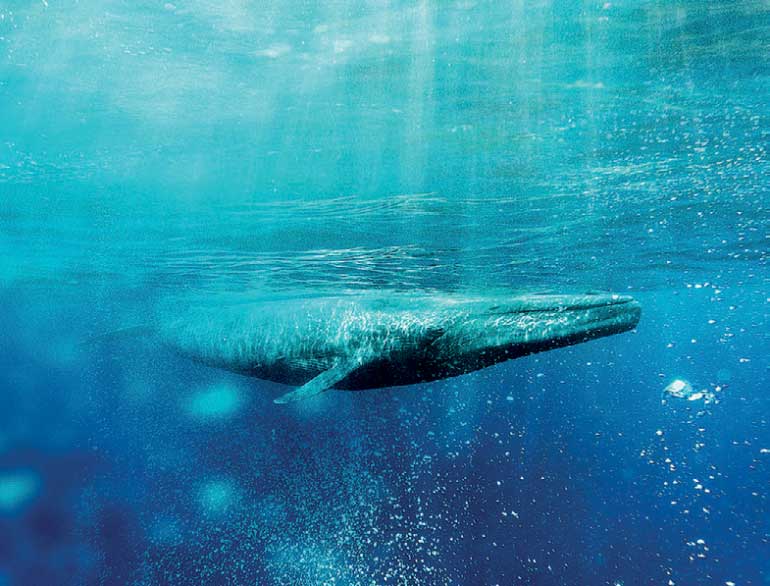
Sri Lankan Airlines pays homage to mother nature on World Environment Day
SriLankan Airlines delighted passengers with the exotic, lush sounds of Sri Lankan nature and wildlife that were played onboard all it flights operated on World Environment Day 2022.
Drawing inspiration from UNEP’s global theme #OnlyOneEarth celebrating the 50th Anniversary of World Environment Day, SriLankan was perhaps the world’s only airline to treat passengers to sounds of nature at 30,000 feet above ground, where they would least expect to hear bird calls or whale whistles, on this special day.
SriLankan sourced sound emulations of several natural heritage sites in Sri Lanka. These included sounds of crickets and other insects from the Knuckles Mountain Range, a UNESCO designated World Heritage Site; whale vocalisations from the Mirissa seas; songs and calls of a variety of bird species surrounding the ancient Sigiriya rock fortress; and relaxing ocean sounds of the Southern beaches. The nature and wildlife recordings were played back over the passenger address (PA) system of each aircraft with a brief voice over description of the sound.
This unique project created a magically soothing moment on board, allowing passengers of different nationalities to share in an experience and become one with Sri Lanka’s natural heritage. By using nature’s music, the airline was able to emphasise its commitment to conserving the environment through novel ways and the importance of making time and effort to appreciate the natural environment around us.
The nature and wildlife audio clips created for the campaign have also been shared across Sri Lankan’s social media pages including on Facebook, Twitter, and Instagram. Those who did not get to experience the natural sounds onboard may visit the airline’s social media pages to listen to the recordings which have been shared via several animated posts.
On the ground, SriLankan Cares, the corporate social responsibility arm of the airline, together with the Forest Department of Sri Lanka and the students of the Nature Club of the Andiambala Maha Vidyalaya in Katunayake, conducted a workshop to educate school children on everyday green living.
Subsequently, the children took part in a guided project to plant trees donated by students of the Nature Club and the Forest Department of Sri Lanka. The airline believes that greater awareness among the younger generation can pave the way for paradigm shifts in environmental conservation and sustainability. Further, planting trees is one of the most effective ways to sequester carbon emissions.
SriLankan Airlines, as a member of the oneworld airline alliance that has pledged to net-zero emissions by 2050, is taking measured steps towards reducing its carbon footprint. SriLankan was, in fact, one of the first airlines in the world to offset passenger emissions, and was featured in a case study by the Air Transport Action Group. The airline strongly advocates learning, scientific research, and knowledge sharing on environmental sustainability, climate change, and ocean and biodiversity conservation in the region.

“IN CONVERSATION”
We chatted with Ms Sayuri Daluwatte, Group COO of Jinasena Group of Companies, on supporting national development and sustainability efforts during these turbulent times. The Jinasena Group is a General Member of Biodiversity Sri Lanka. This is what she had to say…
“Sustainability as an add on, can quickly become a budget constraint, but sustainability as core, which is done right will never be on the chopping block. It is vital for doing business well and doing business right”
Q: Can you give us a brief introduction to your company?
A: The organization was founded and established in 1905 by the young visionary Jinasena with an ambition to startup an engineering establishment which was to service and repair machinery. This was the first Sri Lankan owned business of that time which marked the beginning of change in the engineering landscape in Sri Lanka.
Jinasena has been a household name for many decades and a quintessential facet of our legacy is delivering customized engineering solutions that enrich lives. The Jinasena Centric Water Pump popularized over five decades ago and continues to be an integral part of our business heritage. It is a name that has passed through every household and still stands firm at the core of our business. Today, we have further fine-tuned the product portfolio to include innovative, cutting edge agricultural and industrial solutions that complement the needs of contemporary customers and most importantly present an unmatched consumer experience.
Q: What drives the Company’s sustainability agenda and what are the key focus areas?
A: As a company, Jinasena’s innovates and develops effective sustainable solutions as part of its core business proposition. We believe our efforts are focused on, socially, economically, and environmentally sustainable solutions. Our core product portfolio is focused on supporting Sri Lanka’s economy through supporting the efficient development of agricultural, water & water recycling, and renewable energy sectors. We develop turnkey solutions for commercial, private, and smallholder operations in these sectors.
Jinasena has been dominant in the agriculture sector, supporting the local farmers and agricultural community for many decades. Introducing our very own centrifugal Jinasena pump and agriculture machinery such as threshers, multi grinders, multi choppers, tea cutters, and straw cutters have mechanized the industry by providing durable and affordable solutions for farmers.
Q: Could you give us an outline of your current sustainability initiatives/ projects?
A: We work on numerous projects across sectors. In the 1990’s we developed a solution to combat the rising prevalence of the Chronic-Kidney Disease (CKD) that was burdening the Sri Lankan healthcare system in the Anuradhapura/ Polonnaruwa districts.
Through partnerships with the Ministry of health, research and innovation, we were able to provide a nanofiltration and reverse osmosis water purification system which is designed to remove contaminants from water including bacteria, viruses, nitrates, sulfates, fluoride, arsenic, and much more. Out of numerous projects we have undertaken designing solutions with various institutions in the country, I would like to share our current efforts on water recycling, to ensure that our people have access to clean drinkable water across the country.
There were a few cases of unidentified kidney disease reported in the Medawachchiya area in the Anuradhapura District in the late 1990s which was spreading systematically, and today the number of patients has increased vastly due to not having clean drinking water. The government has provided clean drinking water to disease-prone areas. However, as a solution to this matter, RO technology has been introduced. At present the government is spending money to install these RO water filters in these areas and medical clinics have confirmed that drinking this clean water will help in controlling the undiagnosed kidney disease in those areas and reduce the rate of new cases. With this in mind, our company established a RO Water Purification System as a Pilot Project in the Koonkatiyawa area of Padaviya. Also, we opened new Water Treatment Plants at Pulichchakulam, Puththalam, and at Thuppitiyawa, Thanthirimale as well for clean drinking water.
Q: What are your company’s key achievements in the sustainability domain and the reasons behind their success?
A: At Jinasena’s, our values are based on quality, integrity, and service. These factors determine the way we work, the quality we offer, and the unsurpassed treatment we give our customers. This is what drives our business and we hire for similar values. Undoubtedly, we have the best technical team at Jinasena to support us. With over 117 years of history and some employees who have been with us for more than 20 years – their knowledge and expertise has been a great strength for our success. We provide our customers with high-quality, durable product/services that gives them a long-term quality solution for their needs.
Q: What are the challenges you see in driving your sustainability agenda forward in the current, extremely volatile business context?
A: The current financial crisis in the country is unprecedented and similar to other businesses in the country, we are also revisiting our strategies and adopting agile strategies to safeguard the long-term interests of the company. Given the sectors we are involved in, we understand our customers need advanced products/solutions to address the current energy crisis and alternatives for fertilizer requirements. During the fertilizer crisis, we introduced several pieces of machinery to produce compost with maximum outputs including a domestic range JSH 3ES, Jinasena Shredder Machine with 3HP single phase motor which can be used effectively to produce high-quality compost in a reduced time.
We appreciate the fact that we can support our communities in economic development ensuring sustainability to our people and their businesses. We strongly feel, that there should be improvements in policies that would support local manufacturers to further drive sustainable initiatives along with their sustainable business operations.
Q: Any interesting future plans?
A: We are currently working on a few initiatives connected to the water industry and the renewable energy sector. While we adjust to volatility of this existing market, we are committed to investing in our human capital continuously. We strongly believe that in these challenging times, we will create more resilience in the company as the nation continues to embrace the worst ever economic crisis since Independence. We are currently exploring how we can support our farmers to transport their crops due to fuel shortages with our fleet operations and while doing so allowing our people to have access to fresh vegetables at an affordable price.
Q: Any message to our BSL members in their Sustainability Journey?
A: Whilst we navigate through these tough times, we should never overlook the importance of doing small things that can make a big impact. As businesses struggle to adapt to the volatility of the market and secure some level of business growth, we should adopt sustainability initiatives that will fuel into a better future for our communities. I strongly believe now is the best time for each business to identify and eliminate waste in the business processes and challenge the status quo. Applying lean six sigma methodologies to review existing processes, and cost structures will lead to reducing waste and costs in operations allowing businesses to focus on key problems and to provide better, quality products/ solutions.
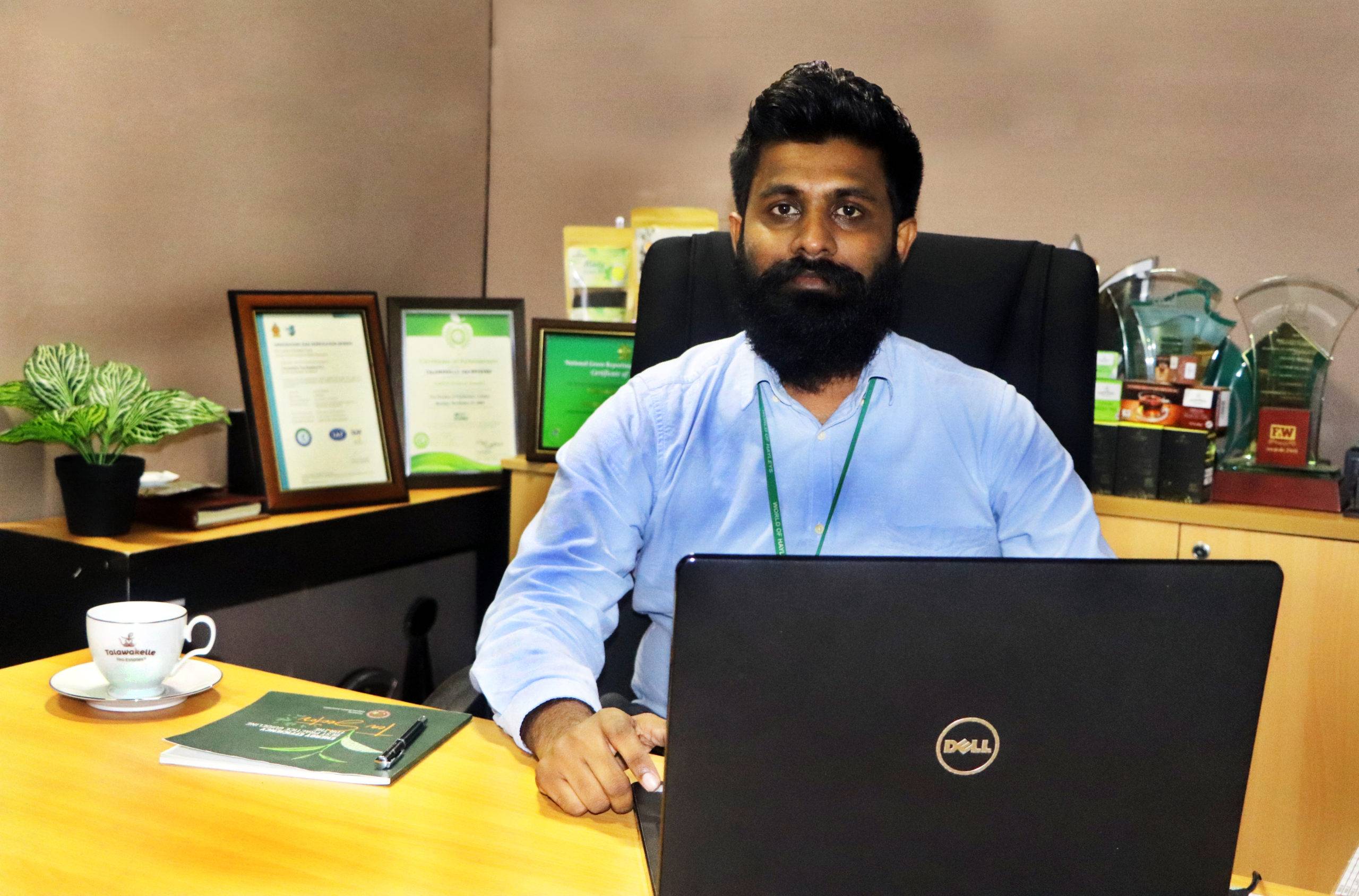
“In Conversation”
with BSL’s Focal Point from Talawakelle Tea Estate PLC, Krishna Ranagala, Manager, Sustainability & Quality Systems Development on the company’s moves towards sustainability in the tea plantation sector and future hopes.
Q: iCan you tell us about your organization?
A: Talawakelle Tea Estates PLC is a Regional Plantation Company, producing some of the finest teas in Sri Lanka. 6,491 hectares of plantations spread across the high grown and Low grown regions of the country, produce 5.93 million kilograms of tea, and accounts for over 2.1% of national tea production. With a portfolio of 16 estates and 14 factories, it ranks at the top for premium tea prices amongst the other plantation companies.
Q: What drives your sustainability agenda and what are the key focus areas?
A: Our company has a deep-rooted legacy in driving sustainable growth. We are a trailblazer within the industry as we lead conversation action on sustainable agriculture practices, conservation of the environment, and human welfare. This culture has been ingrained into the way we function as a result of the Board and senior management, and the remainder of the employees, understanding the need for long-term value created without compromising on the needs of others.
One of the key areas of focus in our sustainability agenda is our people. Our estates employ a workforce of 4,832 and are home to a resident population of over 42,000 people. We heavily invest in ensuring the socioeconomic progression of this entire population.
Given the fact that our business model is heavily dependent on utilizing natural resources, and that our estates are a part of sensitive natural systems, in order to make sure that we are able to continue to create positive gains for ourselves, it’s important that we minimize our negative impact on the natural environment.
Q: Give us an outline of your current sustainability initiatives
A: “Home for Every Plantation worker” is our flagship project for community development. Through this project, for 15 years now, we have driven the socioeconomic progression of our estate community under four pillars. Firstly, we improve their living environment by developing infrastructure facilities including roads, housing, water and sanitation, recreation and learning facilities. The second pillar, community capacity development, is focused on providing financial assistance and strengthening their financial management skills. Thirdly, we raise awareness on nutrition, provide access to better food, and prevent communicable and non-communicable diseases. Lastly, we implement youth development program to build their skills and competencies for them to achieve their life goals and aspirations.
In order to ensure our environmental sustainability, we are focused on converting our business model to one that is low-carbon. To this end, we increase our dependence on renewable forms of energy, with a focus on generation of solar and hydro power. We also undertake the restoration and preservation of ecosystems through dedicated tree planting programs and establishing buffer zones. Through these initiatives, and others, we strive to minimize the negative impacts of our business on the environment, while at the same time, increasing our resilience in facing the threats from environmental phenomenon such as climate change and extreme weather events.
Q: What are your company’s key achievements in the sustainability domain and the reasons behind its success?
A: Under the Home for Every Plantation worker program, in the year 2021/22 alone, we dedicated over Rs. 105 Mn to uplift the quality of life of the local community and ensure better access to facilities. The St. Clair ecosystem restoration project, which is in its third year, has seen a total of 18,138 plants being planted, with a majority of them being native varieties. Our climate action agenda has also marked a significant milestone this year. We are the first company in Sri Lanka to have our GHG emission reduction goals and targets validated and approved by the SBTi. These successes are mainly attributable to the power of our people. Our top management sets the tone for sustainable value creation and provides general strategic oversight. This direction, then trickles down to our people at all levels.
Q: What are the challenges you foresee in driving your sustainability agenda forward in the current, extremely volatile business context?
A: Policy uncertainty is a definite challenge. While we do advocate for measures such as increased worker earnings and organic material sourcing, we believe that such plans should be implemented systematically, and with due care for the concerns of all stakeholders. Otherwise, they result in the opposite of the desired effect. This in turn affects the ability for companies such as ours to contribute to the growth of our dependents as it impedes our own growth.
Sustainability, of course, cannot be achieved alone. A good financial arm is required. Economic indicators such as increasing costs, the forex crisis and interest rates, however, heavily impact our ability to make the financial commitment needed to drive our sustainability agenda forward.
Q: Any interesting future plans
A: In the future, we will continue to work on these initiatives and expand on creating shared value for our people and the environment while sustaining our own growth in the face of growing challenges. We hope to do so by leveraging on our strong systems of management processes.
Q: Have you any messages to our members aspiring to become leaders in Corporate Sustainability?
A: The corporate sector plays a huge role in driving the journey towards a sustainable future. For everyone who aspires to work in corporate sustainability, therefore, there is a vital task at hand. But working for the planet and for the people will bring definite benefits both for the companies we work in and for ourselves. Working in a corporate sustainability role is also sure to bring many challenges from within organizations including cultural challenges and the lack of resources. But as people who are truly committed to transforming the world into a better place, it is important that we remain steadfast and remain true to our own beliefs, and continue to do good.
















